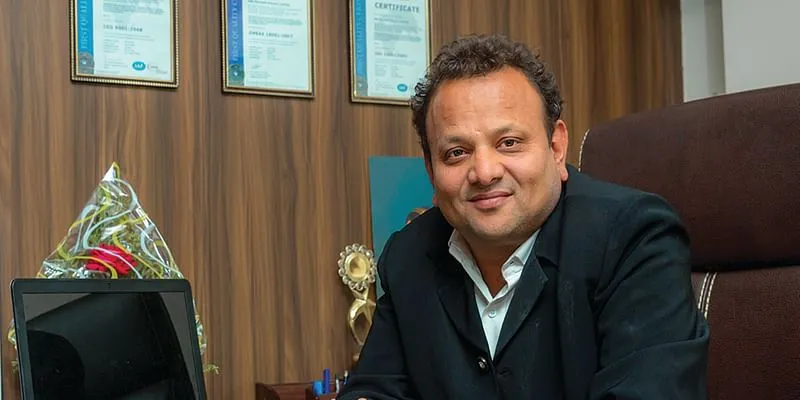From launching anti-hangover drinks to spearheading pharma industry, the top SMB stories this week
This week, SMBStory covered stories of entrepreneurs who grew their businesses tremendously with innovative ideas.
A successful business thrives on innovation, and adopting new techniques is indispensable. When it comes to existing businesses, finding and bringing up new ways to grow is the key.
For budding entrepreneurs keen to grow and scale up, new ideas create an environment of steady competition.
Let’s take a look at stories of entrepreneurs who grew their businesses tremendously with innovative ideas.

Sushant Raorane, Co-founder & Director, Adroit Biomed Limited
Sushant Raorane and Ajit Marathe are veterans in the pharmaceutical industry. They were classmates in college but pursued different paths soon after.
Seven years later, a chance encounter between Sushant and Ajit’s wife Supriya set the ball rolling for their company. Sushant and Ajit saw several gaps in the pharma industry and decided to launch a healthcare marketing consultancy, and launched Adroit Biomed Limited in 2011.
Running a consultancy gave them success but the company remained hidden in the market.
Sushant says while they were helping other companies build brand value, they soon realised that they were not creating something long-lasting for themselves. Hence, they transitioned from a consultancy to a company that focuses on skincare and nutraceutical products.
To begin with, Sushant and Ajit started operations from a small space with 20 people, and were able to reach out to people in Andhra Pradesh, Telangana, Mumbai, and Karnataka.
As the company was being run by first-time entrepreneurs with limited experience and exposure, there were many challenges.
Sushant recalls how Bank of Maharashtra helped them overcome several cash flow gaps effectively. The second challenge was to have manufacturing facilities.
“It was a strategic call. Our requirements are extremely diverse. We need nine to 10 different forms of dosages, each of which requires a unique set up,” Sushant says.
He says, in a strategic move, instead of setting up a manufacturing unit, they decided to tie up with units across the country. Today, the business has tied up with eight manufacturing units in Nashik, Mumbai, and Hyderabad.
Dot Shot

Viraj Patel, Cofounder and Director, Dot Shot
When industrial and chemical engineer Viraj Patel was studying the alcohol market, he felt that tagging alcohol consumption as bad was not responsible. He believed there was a need to acknowledge the changing social fabric and differentiate between social drinking and problem drinking.
Keeping this in mind, he completed a management course from IIM-Bangalore and joined his family business, K Patel Phyto Extractions — a manufacturer of botanical extracts and phytochemicals based out of Mumbai.
“I started adding marketing, distribution, and supply chain ideas in order to expand the family business to finished products and new channels. I wanted to come up with a responsible counter for the ill-effects of social drinking,” the fourth-gen entrepreneur tells SMBStory.
Viraj felt hangovers were often shamed, and started eyeing the anti-hangover market in India.
Except there was one problem – the Indian anti-hangover market did not exist in a developed capacity, other than the limited presence of products like PartySmart, an anti-hangover pill made by The Himalaya Drug Company.
“Indian consumers had been ready for a healthy, wholesome counter to social drinking. But it was challenging to come up with a product since the anti-hangover market didn’t exist in India, and there was no business model to study and learn from,” he says.
Viraj took the challenge in his stride and came up with the idea for Dot Shot, a vegan anti-hangover drink infused with antioxidants and powered by curcumin, the concentrated extract of turmeric.
Dot Shot works by restoring the body’s pH levels, replenishing depleted nutrients and flushing out toxins. It reduces alcohol and acetaldehyde levels in the blood and fends off the common post-party effects of alcohol, such as headaches, body aches or nausea.
“Dot Shot was launched in 2016 under the parent company K Patel. The resources to launch were provided by other companies in the same group. The initial investment was around Rs 2.5 crore,” he says.
Other top stories of the week
Shalimar Paints

Minal Srivastava, Vice President-Growth and Strategy, Shalimar Paints
It takes a lot of effort, courage, and undying determination to build a business empire. There come many instances when an interruption in business takes an entrepreneur many steps back. However, as Winston Churchill once famously said, “Success is walking from failure to failure with no loss of enthusiasm.” A successful business is defined when it surpasses the biggest of the biggest challenges that came on its way.
One such story is of Shalimar Paints. The fire breakout at the manufacturing plant of the company hit the headlines in 2014 when its Howrah plant was under the ashes. And in no less than two years, the heart-wrenching incident happened again in 2016 at its Nashik plant.
“It was a tough time for all of us at the company. The damage was huge, not once, but twice. While we were recovering from the first accident, the second one gave us a downturn,” says Minal Srivastava, Vice President-Strategy, Growth, and Marketing at Shalimar Paints.
Today, as one of Southeast Asia’s biggest paint manufacturing companies, Shalimar Paints is engaged in manufacturing and marketing decorative paints and industrial coatings.
Some of India’s notable buildings and structures such as the Howrah Bridge, Rashtrapati Bhawan, Salt Lake Stadium, All India Institute of Medical Sciences (AIIMS), and many others, continue to be painted with Shalimar Paints. The company has diversified into industrial as well as decorative categories, recently.
With access to high-end technology, Shalimar Paints has introduced many firsts in the industrial coatings segment. Shalimar was one of the first companies to paint a fighter aircraft for the Indian Army.

Arjun Bajaj, Founder of Shinco India
Arjun Bajaj’s father had been running a 35-year-old successful business. As a young and second-generation entrepreneur, Arjun had to dig deeper and work harder to identify the gaps in the system.
This led to the birth of a Made in India television brand Shinco India, an affordable, wide-screen LED TV manufacturing brand, which was launched in 2018 under the parent company Videotex International, a leading ODM television company started by his father Vinay Bajaj.
The televisions are manufactured in the range of 24 inches and 65 inches and priced between Rs 5,400 and Rs 48,000, which are manufactured in the company’s facility in Greater Noida.
At present, the company’s turnover is Rs 250 crore, but Arjun declined to reveal the turnover of the subsidiary.
Ribbon Candy

Meghna Gandhi, Founder, Ribbon Candy
When Meghna Gandhi searched for hair accessories for her daughter, she noticed that they were either imported from China or the US. Nothing of the sort was being made in India.
A former investment banker and an avid embroiderer and crafter, Meghna took it upon herself to make a few hair accessories for her daughter and other little girls among family and friends. She ordered a few supplies online and started making the products.
“My products were well received. I made the first collection entirely on my own and hosted a successful exhibition in Vadodara,” she tells SMBStory.
From here onwards, there was no looking back. Meghna invested Rs 25,000 to start Ribbon Candy in 2011 and put together a small team to produce handmade hair accessories.

Alpesh Gandhi does not come from a business background. His parents were teachers. Hailing from Savarkundla district in Amreli, Gujarat, Alpesh did his engineering in rubber technology and went to work with several companies before shifting to Mumbai.
While doing his MBA, he became a trader to earn some extra income. After completing his MBA, he looked for jobs, but was unsuccessful. At the same time, his trading business was gradually expanding.
“I decided to focus solely on the business because I was getting a good response from customers,” he says.
In 1998, Alpesh started Ami Polymer Pvt. Ltd. with an investment of Rs 13,000, which was the last salary credited to him. The company manufactures silicone-rubber products for the pharmaceutical, food, and medicine industries.
To begin with, Alpesh started the company and managed everything alone. He took orders by himself, and got the products manufactured and sold them. Gradually, his team strength rose to a hundred people. He then rented a small gala on which he set up his manufacturing unit. In 2003, the firm became a private limited company.
Edited by Megha Reddy







